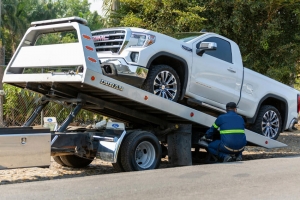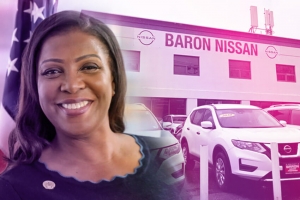
State Approves Dealer Education Law
April 19, 2024Years of work have culminated with a dealer education program being signed into law in Indiana.
The requirement for applicants to complete a training course through the Indiana Independent Automobile Dealers Association before receiving a used motor vehicle dealer license begins July 1.
“It’s a big win for the association,” said Alex Downard, IIADA Executive Director. “We’ve not had any education in place to get a license. Our board fully supported this.”
The IIADA will be working with the Indiana Secretary of State to finalize the program which must provide information on licensing requirements, laws and rules.
The online course, which will also include best practices, will be $300 paid to the IIADA. Only new dealers will be required to take the course.
Downard praised the work of the staff to get the bill passed. He also thanked NIADA for its support, including CEO Jeff Martin meeting with the Secretary of State in the fall after the BHPH Dealer Forum in Indianapolis.
Teamsters Praise Veto of Driverless Cars Bill
April 15, 2024Kentucky Gov. Andy Beshear vetoed House Bill No. 7 that would have allowed driverless trucks and cars on Kentucky roads.
"This bill and others like it are written by and for Big Tech, and Gov. Beshear made the right call by vetoing it," said Teamsters General Secretary-Treasurer Fred Zuckerman. "We encourage every lawmaker who supported this dangerous piece of legislation to reconsider their support for it, given the devastating impact it will have on middle-class jobs and motorist safety throughout the Commonwealth. The Teamsters are asking elected officials in every state to support good union jobs, to protect public safety, and to stand against these deadly autonomous vehicle proposals wherever they pop up."
New Law Targets ‘Dishonest Towers’
April 02, 2024A new measure to protect Florida consumers against dishonest towers was signed into law recently by Governor Ron DeSantis (R-FL). The legislation (HB 179), which was strongly supported by the National Insurance Crime Bureau (NICB), will provide critical consumer protections so Floridians do not become a victim of predatory towing practices.
“Predatory towing in Florida has emerged as a pressing issue for the Sunshine State, significantly impacting individuals’ lives and livelihoods and this measure will go a long way in implementing critical reform measures,” said Eric De Campos, senior director of strategy, policy and government affairs for the National Insurance Crime Bureau.

NICB noted that vehicle accidents that result in predatory towing practices remain a significant issue for policymakers across Florida and the country. After an accident, vehicle owners find themselves in high-stress situations that can create the perfect opportunity for unscrupulous towers to exploit victims. Law enforcement agencies have seen examples of towers charging accident victims exorbitant fees for a tow requiring only a few-miles – sometimes as high as $10,000 for a single, routine tow.
The new law will:
- Require reasonable towing and storage fees so that consumers don’t face fraudulent or inflated charges;
- Require towers to accept additional methods of payment to allow consumers more flexibility to pay their bills and for towers to receive the money they are owed more quickly;
- Shorten notice of lien periods so consumers can more quickly get their vehicles released; and
- Extend the amount of time in which vehicle owners may recover their vehicles before they are sold off.
NY Announces Settlements with Nissan Dealerships
April 01, 2024New York Attorney General Letitia James announced settlements worth more than $1.9 million with five Nissan car dealerships in New York City and on Long Island for overcharging over a thousand New Yorkers who wanted to purchase their leased vehicles at the end of their lease term. An investigation by the Office of the Attorney General found that the dealerships added junk fees or falsified the price of vehicles between 2020 and 2023. The agreements require the dealerships to pay more than $1.6 million in restitution to more than 1,100 consumers and a civil penalty of $340,000.
The OAG opened an investigation into five Nissan dealerships—Baron Nissan on Long Island, Nissan of Westbury on Long Island, Nissan of Kings in Brooklyn, Nissan of Queens, and Nissan of Staten Island—after consumers reported they were being overcharged and given inaccurate receipts. The investigation found that each of these consumers leased their Nissan cars under an agreement that gave them the option to purchase the vehicle for a set amount after the lease term ended.

But when the consumers returned to the dealerships when their leases were up to buy their car, the dealerships substantially overcharged them. The dealers either added miscellaneous “dealership fees” or “administrative fees,” or inflated the vehicle’s price on the invoice given to the consumer. In some instances, customers were overcharged as much as $7,000 on an $18,000 vehicle.
The OAG investigation also revealed that the dealerships provided customers with deceptive invoices. These included misrepresenting illegal upcharges as government fees, such as a $37 state inspection fee that dealers charged as $300, and a $50 title fee dealers charged as $500. New York law guarantees every consumer the right to a complete and accurate receipt for every car sale, yet thousands of examined invoices failed that basic test.
Under the agreements announced today:
- Baron Nissan will pay $204,656.89 to 186 overcharged consumers and a $51,190 penalty.
- Nissan of Kings will pay $437,560.86 to 420 overcharged consumers and a $147,000 penalty.
- Nissan of Queens will pay $608,347.83 to 276 overcharged consumers and a $69,757 penalty.
- Nissan of Staten Island will pay $282,255.61 to 184 overcharged consumers and a $55,200 penalty.
- Nissan of Westbury will pay $102,636.07 to 72 overcharged consumers and a $19,440 penalty.
The penalties paid by each dealership vary based on the number of consumers overcharged and the pervasiveness and severity of the overcharging. The dealers have also agreed to audit all deals between the start of the investigation and the present and will provide additional refunds to overcharged consumers identified in that audit.
U.S. Senators File Recall Legislation
March 28, 2024Three U.S. senators filed a bill that would require car dealers to repair any outstanding safety recall on used cars before selling, leasing or loaning them to customers.
Richard Blumenthal (D-CT), Edward Markey (D-MA) and Elizabeth Warren (D-MA) filed the bill.
“Whether a car is brand new or used, nobody should be at risk of purchasing an unsafe car,” Markey said in a press release. “And it doesn’t matter if a car is still on the lot or in a driveway, it needs to be made safe.”
The bill specifically addresses safety recalls. According to Blumenthal’s press release on the bill, manufacturers will be required to provide dealers with parts to make the necessary repairs within 60 days or reimburse the dealers.
The bill does provide exceptions, including recall information not being available at the time of the sale, vehicles being sold at wholesale and vehicles being sold as junk.
According to a National Highway Traffic Safety Administration report issued earlier this month, the agency issued 1,000 recalls for vehicles, car seats, tires, RVs and other equipment in 2023. Nearly 35 million vehicles were recalled in 2023.











